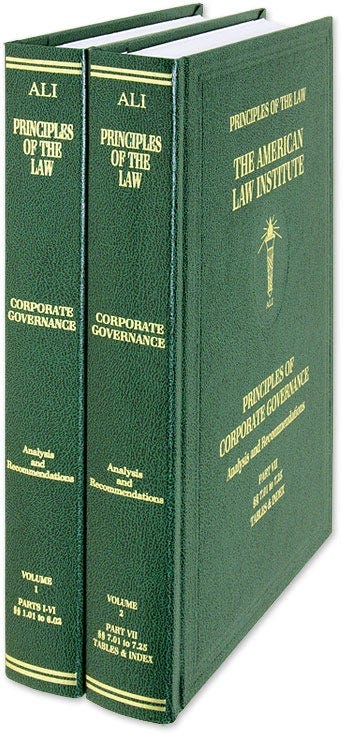Restating the Law of Conflicted Controller Transactions: Part 1
Delaware Law Before SB 21
In 1978, the American Law Institute (ALI) authorized a project originally intended to result in a Restatement of corporate law. The new project was explicitly responsive to the ferment in corporate governance of the period. In the period leading up to the project, both establishment figures such as former Securities and Exchange Commission (SEC) Chairman William Cary and liberal activists such as Ralph Nader vigorously criticized state corporate law and advocated a federal law of corporations. At least in part, the project was intended to fend off federal incorporation.
Not surprisingly, given that background, the drafters intended their project to be a departure from traditional Restatements. As they visualized it, the project was to offer “a combination of classic Restatement, forward looking guidelines, and perhaps also model provisions.” Principles of Corporate Governance and Structure: Restatement and Recommendations ix (Am. L. Inst., Tent. Draft No. 1 1982) [hereinafter Draft No. 1]. Their efforts, however, met with immediate resistance. When Tentative Draft Number 1 was published in 1982, it was widely criticized for failing to restate the law but rather proposing major and dramatic changes in the law.
As the decade long process of reaching consensus on the corporate governance project dragged on, it became what is still one of the most controversial projects the ALI ever attempted. Indeed, one highly respected commentator went so far as to describe the project as “the most controversial event in the history of American corporate law.” William J. Carney, The ALI’s Corporate Governance Project: The Death of Property Rights?, 61 Geo. Wash. L. Rev. 898, 898 (1993).
Despite this dubious precedent the ALI has returned to the corporate governance field with a proposed Restatement of the Law of Corporate Governance (Restatement). As with all Restatements, the purpose of the Restatement of corporate law is to clarify “the underlying principles of the common law” that have “become obscured by the ever-growing mass of decisions in the many different jurisdictions, state and federal, within the United States.”
Candidly, I have been skeptical of the whole project. See my article Do We Need A Restatement of the Law of Corporate Governance?, 78 Business Lawyer 439 (2023). In a majority of states, the Model Business Corporation Act provides detailed statutory guidance as to which common law functions, at most, interstitially. In addition, corporate law is virtually unique in being dominated by the law of a single jurisdiction; namely, Delaware. Given the prominence of Delaware law in this field, a Restatement of corporate law is unlikely to be influential.
Despite my protestations, the drafters have soldiered on. So the Restatement is going to happen. The task now for those of us who labor in this vineyard is to try to influence how it comes out.
In 2022, the drafters released Tentative Draft number 1, which proposed draft provisions with respect to the duties of care and loyalty. Proposed § 5.10 laid out rules for evaluating conflicted controller transactions. As we shall see, the proposed rules largely tracked Delaware law as laid out in Kahn v. M&F Worldwide Corp., 88 A.3d 635 (Del. 2014).
But MFW is no longer good law in Delaware. As most readers of this blog will know, Delaware recently adopted SB 21, which created a new safe harbor for conflicted controller transactions. Given that development, I’ve been wondering whether the Restatement’s drafters will be revisiting § 5.10 and, if so, what changes they might make.
I’m planning a series of posts on the topic. In this post, I’ll summarize Delaware law prior to SB 21. In the next post, I’ll summarize the Restatement’s approach. In the third post, I’ll summarize SB 21. In the fourth post, I’ll discuss the law in other states. In the final post, I’ll lay out the way I think these cases out to be resolved.
Keep reading with a 7-day free trial
Subscribe to Bainbridge on Corporations to keep reading this post and get 7 days of free access to the full post archives.


